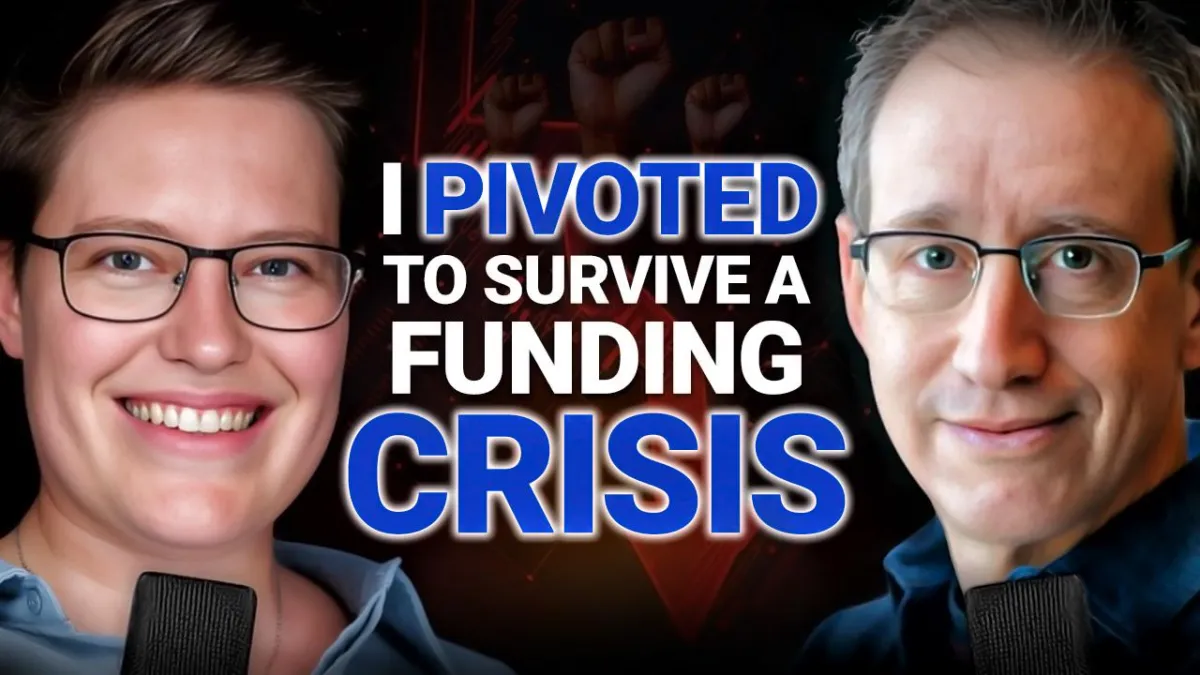Rocket Ship Founder Podcast
Rocket Ship Founder is my weekly podcast dedicated to supporting Founders on their journey. Episodes are short (around 12 minutes) but high value. Each week I dig into a particular topic on Founder life. Special focus on helping ADHD Founders, building great offers and reliable lead flow. Enjoy!
Previous Posts and Podcast Episodes

Can Support for ADHD Adults Strengthen Relationships
Securing the right funding is one of the biggest challenges for early-stage teams working on social or environmental change. Many have strong ideas and the drive to make a difference, but struggle to connect with the funders who can support their work.
Some lack experience with grant writing, while others do not have the systems to show how funds will be used or measured. Conversely, funders want to back meaningful projects but need confidence that their money will deliver real results. This gap makes it harder for important work to grow.
Beck Hayes, a session lead, consultant, and writer, works at the intersection of climate innovation and mission-driven organizations. At Climatebase, Beck supports climate founders through ideation and project management, while at The Atharii Collective, she provides consulting that connects funders with frontline teams. She also writes for Sowing Seas, amplifying impactful narratives with insight and creativity.
She has led projects in international development, sustainable ocean farming, and climate innovation across Central America, the Caribbean, and the United States.
In this article, we will explore how to secure funding, adapt when it disappears, and why Support for ADHD Adults can help people and organizations achieve lasting results.
How Early-Stage Social Impact Teams Can Secure the Right Funding
Early-stage teams working on social or environmental change often struggle to get funding. They have the drive but not the money to grow. The problem usually comes down to one thing: funders and founders don’t know how to find each other.
Many of these teams don’t have grant writers. Some don’t know what funders look for. Others don’t have clear systems to show how they use funds or measure success. Conversely, funders want to help but must trust that the money will be used well. That’s where strong systems and clear goals matter most.
Key Funding Sources to Consider
Social impact teams should focus on three major funding channels:
Philanthropic grants offered by private foundations and nonprofits
Government grants from federal and state-level programs
Strategic partnerships with companies or aligned organizations
Each source works differently. Government funding can be helpful, but it may shift with policy changes. Teams must stay informed and ready for those shifts.
Common Challenges in Securing Grants
Most early-stage teams face the same issues. They don’t know how to write strong grant proposals. They may miss key details funders expect. Some don’t have the tools to track progress. Others don’t show how they plan to grow or stay active over time.
These gaps can hold them back. Fixing them early makes it easier to get and keep funding. Teams that build clear systems, track what works, and stay ready to show results often move forward faster.
Funders want to support work that makes a real impact. But they also need to trust the teams behind it. Clear planning, strong systems, and simple reporting can help build that trust.
What Should Organizations Do When Funding Suddenly Disappears?
When a major funding source ends, it can feel like everything is falling apart. But there is always a way forward.
Stay Calm and Focused
The first step is to pause and refocus. The mission still matters. People still need healthcare, housing, support for climate issues, and more. That doesn’t change just because the funding does. Instead of getting stuck, ask: What can we do now? What options do we still have?
Look for New Paths
Many teams don’t know where to turn next when federal funding disappears. But there are other options:
Local and state grants
Private foundations and donors
Small earned income ideas
New partnerships and relationships
Many nonprofits don’t think about earning money. But even small income streams can help fill the gap. Teaching teams how to try new ideas strengthens them in the long run.
Understand Why This Shift Matters
Federal cuts affect more than just one organization. Recent changes removed funding three times larger than all U.S. philanthropy combined. That includes the biggest foundations and donors.
This money supported early research, social programs, and climate work. These are things most private investors don’t fund. They want quick results, not long-term projects. That’s why public funding was so important.
Keep Moving Forward
Funding loss is hard, but it doesn’t have to stop progress. There’s always another path if you’re willing to adapt. The key is to stay focused, act fast, and explore new ways to keep the work going. Change is never easy, but it can lead to smarter, more flexible growth methods.
How Support for ADHD Adults Begins with Proper Diagnosis
Many adults live with ADHD for years without knowing it. They stay busy, succeed in school, and take on too much. But behind that success, they often feel stressed, forgetful, or overwhelmed.
Why It Gets Missed
ADHD isn’t always easy to spot, especially in women. It doesn’t always look like hyperactivity. Instead, it shows up as:
Overworking or overcommitting
Feeling scattered or low on energy
Ongoing anxiety or depression
Trouble staying focused or organized
People often assume this is just how life feels. They keep pushing through, thinking everyone deals with the same stress. If they do well in school or work, no one questions it. Over time, this takes a toll. Therapy helps a little, but something still feels off.
What Leads to Diagnosis
Many people reach a breaking point. They burn out, feel lost, or stop making progress in therapy. That’s when they decide to look deeper.
Talking to a psychiatrist, not just a therapist, helps. A proper evaluation can confirm ADHD. Getting that answer often brings relief. It explains the years of mental and emotional struggles.
What Treatment Works
One approach that helps is Dialectical Behavior Therapy (DBT). It’s different from regular talk therapy. DBT teaches:
How to manage emotions
How to stay calm in stressful moments
How to build better relationships
How to stay present and focused
It’s structured and hands-on, which works well for ADHD minds. People use real tools, track their progress, and build awareness.
The biggest shift is learning that you are not your thoughts. That single idea can change how someone sees their entire life. And that’s where real growth starts.
How Support for ADHD Adults Helps Them Stay on Track
Staying focused with ADHD isn’t always easy. Starting is hard. Finishing is harder. But with the right setup, you can stay on track without feeling drained.
How Accountability Supports ADHD Adults to Keep Moving
One of the most helpful tools is accountability. It means having someone who checks in with you or works beside you. This small change can make a big difference.
You don’t have to do it alone. Working with others can help your brain stay active and clear.
Simple Ways to Stay Accountable
Here are easy methods that work well:
Body doubling: Work quietly beside someone in person or online. You don’t even need to talk.
Join co-working spaces: Shared work areas create a strong sense of focus and structure.
Schedule check-ins: Hold short calls weekly or monthly with a friend or teammate. These keep you focused.
Create planning routines: Set aside weekly time to plan tasks with someone you trust.
These small habits help your brain stay steady. They reduce the urge to avoid tasks or overthink decisions.
Finding Peer Support for ADHD Adults
Working with others who have ADHD helps even more. You don’t have to explain yourself. You don’t have to pretend to work like everyone else.
This support allows you to be yourself while still getting things done. It’s not just about tasks, it’s also about feeling seen.
In short, ADHD needs a different kind of structure. You can still do great work. You just need systems that match how your brain works best. Accountability is one of the simplest and most powerful tools to start with.
Conclusion
Getting the right funding and building strong systems helps early-stage social impact teams grow and stay active. Clear goals, trusted relationships, and flexibility make it easier to keep going, even when major funding stops.
The same is true for personal growth, especially for adults with ADHD. With the right support and strategies, challenges can turn into steady progress.
Support for ADHD Adults starts with knowing how it affects daily life. A proper diagnosis can bring relief and direction. Practical tools like DBT, accountability partners, and structured planning help improve focus and follow-through.
Simple steps such as body doubling, joining co-working spaces, or setting regular check-ins can keep momentum strong. Having a community that understands ADHD removes the need to explain or hide struggles, which makes it easier to stay consistent.
In both funding work and managing ADHD, the lesson is clear. Setbacks do not have to stop progress. There are always new options to explore and people willing to help.
The goal is to keep moving forward, stay committed to what matters, and use methods that work for your needs. When focus, adaptability, and the right support come together, it is possible to keep making a real difference.
FAQs
What is the first step in finding Support for ADHD Adults?
The first step is getting a proper diagnosis from a qualified professional. This helps you understand the challenges and choose the right management tools.
How can support for ADHD Adults improve focus at work?
Support can include structured planning, accountability partners, and small routines that make starting and finishing tasks easier.
Does Support for ADHD Adults always require medical treatment?
Not always. Many benefit from therapy, coaching, and practical strategies, while some also use medication based on a doctor’s advice.
How does the community play a role in supporting ADHD Adults?
Being part of a community that understands ADHD reduces isolation, builds confidence, and helps maintain consistent progress.
Can Support for ADHD Adults help with personal relationships?
Yes. Tools like DBT and better emotional regulation can improve communication and reduce relationship misunderstandings.
STAY CONNECTED & KEEP LEARNING
Mastering focus and building a thriving business with ADHD doesn’t happen overnight, and you don’t have to do it alone.
Subscribe to the ADHD Entrepreneurs Newsletter on LinkedIn to get stories, tips, and ADHD-friendly strategies straight to your inbox to help you stay out of overwhelm, reclaim your focus, and achieve your full potential.
Copyright 2025 Steve August Coaching | All Rights Reserved

